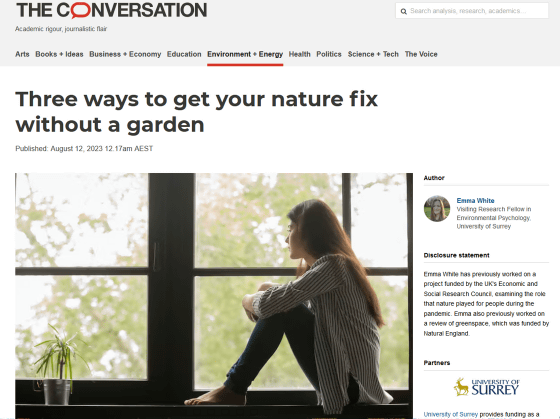What are three ways to enjoy the benefits of contact with nature while living in a house without a garden?

Gardening at home has been shown to improve
Three ways to get your nature fix without a garden
https://theconversation.com/three-ways-to-get-your-nature-fix-without-a-garden-210829

Gardening in your own garden is an easy way to get in touch with nature, but a survey conducted in the UK in 2021 found that young people aged 16 to 24 are more likely to enjoy gardens or community gardens than older people aged 65 and over. It has become clear that it is twice as difficult to access. A 2021 study by White and colleagues also found that in the UK, younger people and people on lower incomes are less likely to own a garden.
Mr. White introduces ``three ways'' to benefit from nature in your home or neighborhood even if you don't have access to a garden.
◆1: Visit the park
Even if your home is far from mountains or forests, there are probably many people who have a small park or green space with trees within walking or cycling distance. According to the UK's Office for National Statistics, more than a quarter of people living in the UK live within a 5-minute walk of a public park, and 72% live within a 15-minute walk.
If these parks have cafes, benches, or lawns you can lie on, you can gather with family and friends there, and White says, ``Building these social relationships has many health benefits.'' ” states. However, White points out that the quality of parks within cities tends to be better in areas with more wealthy people than in areas with more poor people, and there are social inequalities here. Did.

◆2: Grow ornamental plants at home
Houseplants are the simplest way to bring nature into homes without a garden, and research has shown that growing houseplants can actually have benefits such as improving
In addition, houseplants have the potential to improve study and work performance. For example, a study of college students found that more students preferred to study in study rooms with plants than in study rooms without plants, and that the presence of plants improved performance on demanding tasks. There are also studies showing that having houseplants increases productivity and reduces sick leave.
Some people may say, ``I'm interested in houseplants, but I'm a beginner, so I'm afraid of accidentally killing them,'' but Mr. White says that even if you're a qualified gardener, you can never accidentally kill a plant. Pointed out that there is. 'Growing plants is all about trial and error,' he said, advising people not to be afraid of failure.

◆3: Watch videos of nature
For those who say, ``There are no parks or green areas near my home, nor do I have the luxury or confidence to grow houseplants,'' Mr. White recommends ``watching videos of nature on TV or the Internet.''
“No matter your situation, there is always a way to bring a little nature into your life,” White said.

Related Posts:
in Science, Posted by log1h_ik







